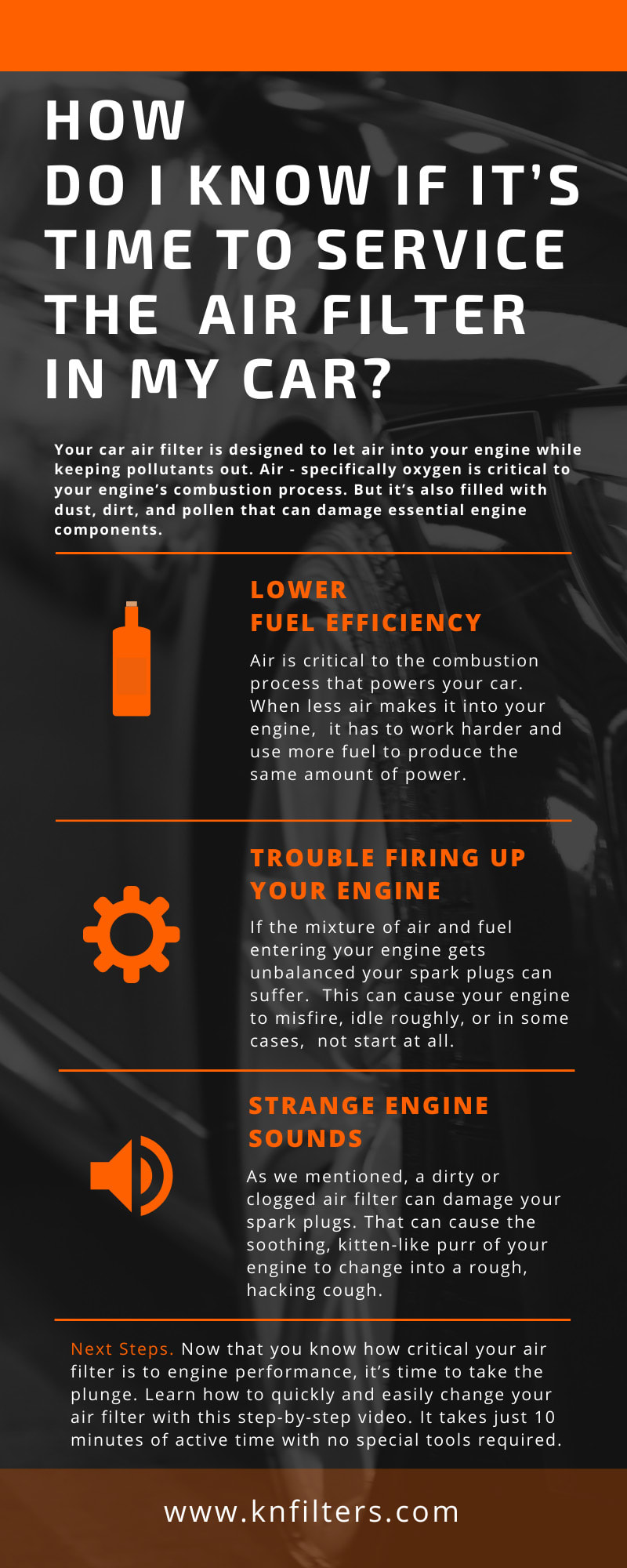We use cookies to make your experience better. To comply with the new e-Privacy directive, we need to ask for your consent to set the cookies. Learn more.
HOW OFTEN DO I CHANGE MY CAR FILTER?
Why is air filter maintenance necessary?
Your car's engine air filter is designed to let air into your engine while keeping pollutants out. Air - specifically oxygen - is critical to your engine’s combustion process, but it’s also typically filled with dust, dirt, and other pollutants that can damage essential engine components. If those components wear down, combustion gas can start to leak, and that can significantly reduce the efficiency of your engine. You might notice smoke, sluggish acceleration, and a decrease in fuel efficiency. This can lead to irreparable engine damage and repairs that may cost thousands of dollars. The good news? Cleaning and maintaining your car’s air filter is typically a breeze. You can do it yourself without special tools in less than ten minutes.What does an engine air filter do?
The primary job of your air filter is to protect your engine from harmful contaminants. Your air filter helps your vehicle breathe better, allowing efficient airflow into your engine while keeping the vast majority of dirt and pollutants out of the system. Clean airflow helps maintain the lifespan of your engine. By keeping contaminants out, you reduce the chance of particulates or excess fuel building up in your engine. In addition, better airflow typically translates to more horsepower and acceleration. Whether you’re on the racetrack or the road, that means muscle you can count on.
What is the difference between engine air filter types?
Both airflow and filtration efficiency are key to performance, and your air filter should strike a critical balance between allowing as much air into the intake of the vehicle as possible while limiting the flow of particulates. Most disposable air filters are "barrier filters", which are designed to effectively stop dust particles from flowing into your engine. However, while traditional paper filters are often highly efficient at capturing particles, they are often made of materials that restrict airflow, which can reduce engine performance. K&N® High-Flow Air Filters™ feature layers of pleated, breathable cotton with proprietary red filter oil. Together, the cotton and oil are designed to absorb dirt and dust particles. This combination allows clean air to continue flowing into your engine - up to 50% more air than those traditional, single-use filters. For you, that means more horsepower, torque, and acceleration from the vehicle you already own, and it’s why many of the world’s elite racers trust K&N air filters to support their engines during the world’s most grueling events.How can I take my air filter to the next level?
Your air filter is a key component of your vehicle’s air intake system and can often have a significant impact on performance. However, you can further increase performance by upgrading your entire air intake system. K&N’s cool air intake systems replace the maze of tubes that feed air into your engine with one large tube that allows for a freer flow of cool air - and more (clean) air means more horsepower. K&N intakes also include a heat shield or enclosed air box to help isolate the intake air from engine heat. This allows cooler air into the engine, which can increase engine combustion efficiency and improves overall performance. K&N even provides a horsepower guarantee for all of its intakes.How often should I change my car air filter?
Under normal highway driving conditions, your car’s air filter typically needs to be replaced every 12-15,000 miles, which is approximately once a year depending on driving habits and conditions. If you commute through high-traffic, high-congestion areas, you might want to replace your filter every 6,000 miles. At that point, you’d need to throw away your used paper filter and purchase a new one. K&N High-Flow Air Filters™ are designed to last for the life of your vehicle, and are protected by a Million-Mile Limited Warranty. With normal use, they can go up to 50,000 miles before a cleaning is needed (the larger conical filters included with K&N intake systems can go up to 100,000 miles between services). Assuming your total engine life is 175,000 miles, and you replace your air filter every 15,000 miles, you would need just one K&N filter versus eleven disposable paper filters, which can translate to a savings for both you and the environment.How do I know if it’s time to service the air filter in my car?
When dirt or particulates enter your engine, they can cause damage that may significantly impact your car’s performance. You might notice:- Lower fuel efficiency. Air is critical to the combustion process that powers your car. When less air makes it into your engine, it has to work harder and use more fuel to produce the same amount of power. When it’s time to clean or replace your air filter, you may notice a decrease in your day-to-day gas mileage.
- Trouble firing up your engine. If the mixture of air and fuel entering your engine gets unbalanced, your spark plugs can suffer. This can cause your engine to misfire, idle roughly, or in some cases, not start at all.
- Strange engine sounds. As we mentioned, a dirty or clogged air filter can damage your spark plugs. That can cause the soothing, kitten-like purr of your engine to change into a rough, hacking cough. If you notice vibrating or slipping, then it might be a good time to change your air filter.
- Your service engine light goes on. When the mixture of air and fuel entering your engine gets unbalanced, fuel deposits can build up. That build-up should trigger your service engine light, at least on a relatively new vehicle.
- Dirt exceeds the wire mesh of your filter. A typical paper disposable air filter is white or off-white when new. Over time, as it filters out pollutants, it turns darker in color as dirt deposits build up on the filter paper.
In the case of a red or black K&N air filter, you will see dirt extending beyond the protective wire mesh of your filter. - You have trouble accelerating. If your car doesn’t respond normally when you step on the gas, or if you notice jerking movements, your engine might not be getting their air it needs to perform its best. Check your air filter for dirt and build-up.
- Smoke or flames from your exhaust. If your engine doesn’t get the air it needs for combustion, some fuel may exit the car through the tailpipe. That can lead to black smoke, popping sounds, or even flames when the excess fuel ignites.
- A gasoline smell. If your engine doesn’t get enough air when you start your car, excess, unburnt fuel may exit your exhaust, causing that tell-tale gasoline smell.






